Books by Petek Onur
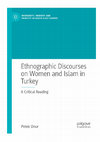
Ethnographic Discourses of Women and Islam in Turkey: A Critical Reading, 2024
This book provides a meta-reading of how ethnographic discourses on women and Islam in Turkey ha... more This book provides a meta-reading of how ethnographic discourses on women and Islam in Turkey have changed since their emergence in 1983. It analyses the published ethnographic works in three discursive periods and shows that paradigm shifts in social sciences, processes of neo-liberal globalization and globalization of Islamism as well as political, social, cultural and economic transformations at the local level shape these periods. As an exceptional example of modernization in the Middle East and the post-imperial states in South-East Europe, Turkey has been experiencing tensions between Islamic beliefs and practices and Westernization and secularization processes. Countless aspects of Muslim women’s lives appear as symbols and indicators in this society like in many other Muslim majority societies and to scholars of gender and women’s studies in discussing the faith-based patriarchy. Thus, this book exhibits the necessity of developing a critical perspective on ethnographic representations of Muslim women in Turkey.
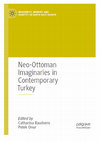
Ed: Catharina Raudvere - Petek Onur
This book presents gendered readings of cultural manifestatio... more Ed: Catharina Raudvere - Petek Onur
This book presents gendered readings of cultural manifestations that relate to the Ottoman era as a preferred past and a model for the future. By means of claims of authenticity and the distribution of imaginaries of a homogenous desirable alternative to everyday concerns, as well as invoking an imperial past at the national level. In this mode of thinking, shaped around a polarised worldview, Republican ideals serve as a counter-image to the promoted splendour and harmony of the Ottomans. Yet, the stereotypical gender roles inextricably linked with this neo-Ottoman imaginary remain largely unacknowledged, dissimulated in the construction of the desire of an idealised past. Our adaption of a cultural studies perspective in this volume puts special emphasis on agency, gender, and authority. It provides a shared ground for the interrogation, through the contributions comprising this project of knowledge production about the past in light of what constitutes acceptable legitimacy in interpreting not only the canonical literature, but history at large.
Book Chapters by Petek Onur

The Politics of Culture in Contemporary Turkey, 2021
In recent years, the historical centre of Ankara, has undergone remarkable restoration and renova... more In recent years, the historical centre of Ankara, has undergone remarkable restoration and renovation processes. New shops, cafés, restaurants, hotels, and museums have been opened and the city’s historical neighbourhoods are being (re)discovered by tourists and local residents alike. In contrast to the Ankara Citadel quarter, which has gone through fragmented restoration and transformation processes for the past 30 years, these new tourist sites are characterized by neo-Ottomanist cultural practices, neo-liberal economic activities and Turco-Islamic connotations. They stand out as spatial embodiment of the ruling elite’s cultural politics with all their social and cultural networks of power. The spatial representations of Ottoman heritage, which are meant to signify the ruling elite’s power as well as a new notion of public memory, are deeply influenced by Turkish popular culture, first and foremost, popular TV series on different periods of Ottoman history, thereby calling the authenticity of these new historic sites into question. Ankara’s new urban culture appears as the perfect example of restorative nostalgia, which is defined by Svetlana Boym as a nostalgia that promises the rebuilding of the lost past and filling the spaces in the memory with new constructions. By means of inventing traditions, it serves nationalist and religious politics. This chapter is based on field research investigating the (re)created nostalgia culture of Ankara’s historic Hamamönü and Hamamarkası neighbourhoods. Portraying the cultural outcomes of this urban transformation, it discusses the role of the politics of memory that deeply influence modern day myths embodied in these urban spaces.
Papers by Petek Onur
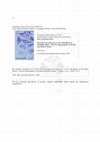
Fe Dergi: Feminist Eleştiri, 2019
The ethnographic study of the relationship between gender and Islam in Turkey has a recent histor... more The ethnographic study of the relationship between gender and Islam in Turkey has a recent history which dates back to the early 1980s. The ethnographies conducted by Carol Delaney, Julie Marcus and Nancy and Richard Tapper constitute the initial discursive period with a number of commonalities in their research questions and analysis, most important of which is a claim about how gender hierarchy is legitimized in Turkish society through Islamic premises. Based on the critiques of Western
ethnocentricsm, Orientalism and First World feminism and Michel Foucault’s theorization of discourse, power and knowledge, this study makes a discourse analysis of the published works of these studies. It
discusses the ways they are influenced by and reproduce the academic Orientalism in studying Islamic cultures in their discursive representations of Muslim women. Muslim women’s agency, subjectivity
and otherness in the ethnographies are highlighted as the most critical issues to be analysed in this respect. The analysis suggests that all of them represent Muslim Turkish women as victims of religion, patriarchy and traditions, fail to consider the complexity and diversity of Islamic beliefs and rites, fail to contextualize the Islamic culture they observed, and suggest the existence of a persistent and constant
legitimating structure for the gender hierarchy.
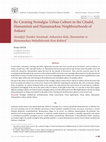
Ankara Araştırmaları Dergisi (Journal of Ankara Studies), 2018
Conservation, renovation, restoring and urban regeneration activities have been carried out in th... more Conservation, renovation, restoring and urban regeneration activities have been carried out in the historic centre of Ankara, in Ankara Citadel since 2007 and right beside it, in Hamamönü both by local government and investors from the public sector and small-scale enterprises. Hamamarkası region has been the last episode of this process. These activities construct spaces for the consumption and demands of the tourists as well as urban travellers and create a new nostalgia culture based on the phenomenon of authenticity by means of aestheticisation practices. Local ties of belonging which weaken with modernization of globalization come to the fore again and become determining in the production and consumption phases of nostalgia culture. The aim of this study is to examine the formation of the nostalgia culture in these historic regions of Ankara and the diversities that have been produced within it by several actors. Based on the fieldwork comprising the enterprises like cafés, restaurants, antique shops, art galleries, art studios, boutique hotels in the regions, the study presents the repercussions of social memory, traditions, perceptions and longings of the past in the urban culture of Ankara. In the light of these data, it is seen that in these three regions different nostalgia cultures are formed and the emerging cultures are both influenced by neo-liberal globalization and the prevailing political dynamics in Turkey, particularly by the policy of neo-Ottomanism which has been effective in the last ten years.
Conference Presentations by Petek Onur
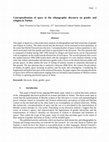
This paper is based on a critical discourse analysis of ethnographies and field researches on gen... more This paper is based on a critical discourse analysis of ethnographies and field researches on gender and religion in Turkey. The study reveals that the discourse can be analyzed in three epistemes, in the sense that Michel Foucault uses the term. Conceptualization of space in these epistemes is very much associated with how gender and Islam is represented in the discourse. The first episteme that is composed of studies during 1987-1992 mostly in villages and small towns can be characterized with its emphasis on the inside/outside distinctions of rural space. The second episteme that covers the studies between 1994-2006 mostly deals with the emergence of a new Islamist identity in big cities like Ankara and Istanbul and discusses gender with a focus on the divide between public and private spaces. In these studies the issue of veiling of Islamist women is commonly discussed on this ground. The last episteme that is analyzed is between 2006-2014. We witness the prevalence of studies on public space focusing on politics and lifestyle and consumption. Considering the fragmented and hybrid structure of the analyzed discourse, the paper argues that conceptualizations of spaces have different implications ranging from an Orientalist representation of Muslim women in Turkey to ignoring patriarchal aspects of Islam.
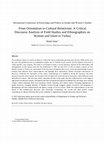
The academic interest in women an Islam in Turkey has been continuously growing since the late 19... more The academic interest in women an Islam in Turkey has been continuously growing since the late 1980s which were the years that gender became an independent subject area in Turkish social sciences and the Islamist movement in Turkey gained a new impetus. This study is an attempt to make a critical discourse analysis of the field studies and ethnographies on this subject from the first publication in 1987 up until 2015. It aims to depict a picture of how Muslim women in Turkey are represented in this discourse throughout these years, reveal the epistemological power relations that influence these representations and highlight their implications. Michel Foucault's theorization of discourse constitutes the foundation of this study's methodology as it enabled to divide the discourse into three discursive periods and to analyse the formation and circulation of certain discursive formations within different social and political contexts. This discourse which constitutes the data of the study, has been influenced by a wide range of approaches and theories namely, Orientalism and thus essentialist perceptions of Middle East and Islam, post-colonial critique, radical feminism, third wave feminism, Islamic feminism and cultural studies. Changing legitimations of gender hierarchy, changing identities of Muslim women through struggles against secularism and integration to globalization and their empowerment and agency emerge as the key issues. While the representations in the first period of this kaleidoscopic discourse have Orientalist connotations, the second and third periods contain connotations of cultural relativism that in turn contribute to legimations of gender hierarchies based on Islam.
Feminist Political Writings by Petek Onur
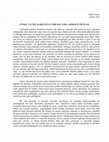
Toplumda eğitimli erkeklerin bunları çok daha az yapacağı gibi genel bir kanı yerleşmiş olduğunda... more Toplumda eğitimli erkeklerin bunları çok daha az yapacağı gibi genel bir kanı yerleşmiş olduğundan, üniversitelerde cinsel taciz ve tecavüz başta olmak üzere her türlü erkek şiddetinin daha az olacağı bekleniyor. Ne büyük bir yanılgı! Üniversiteden yolu geçmiş her kadın, ister öğrenci ister çalışan, bilir ki yaşadığımız bu ataerkil dünyada hiç bir yer erkek egemenliğinden muaf değil. Hatta tam da bu söz konusu genel kanı nedeniyle bu tür kurumlarda çok daha incelikli ve gizil ve en çok da ikiyüzlü formlarıyla erkek şiddeti hayat buluyor. Özellikle genç kadın akademisyenler ya da akademisyen adayları, eril akademinin görünmez kurallarıyla bir çok alanda kontrol ve denetime maruz kalırken, aynı zamanda çevrelerindeki erkeklerden –arkadaş, meslektaş, profesör, idari görevli vd. aklınıza kim gelirse-cinsel taciz ve istismara uğrama riskiyle karşı karşıya. En önemlisi ise bu tür olaylar maalesef münferit vakalar olmayıp akademik kültürün bir parçası halinde; ve üstünün örtülmesi, ya da sessiz kalınarak yok sayılması ise adeta yerleşmiş bir gelenek. Tacize uğrayan bir kadın, hele de genç bir öğrenci ya da asistansa, olur da söyleyecek cesareti bulursa buna herkesi inandırması, ikna etmesi gerek. Bunu yapan alanda sözü geçen, ünvanlı ya da yaptığı çalışmalar veyahut eleştirelliğiyle bilinen bir erkekse düşünün durumun vehametini; onun karşısında bir genç kadının sözünün ne kıymeti olur ki?! Kimisi duymak istemez, kimisi duymazdan gelir, kimisi duyup inanmaz, hayatta yapmaz o der; ve çoğunluk ise duyup bilse de aman başımız ağrımasın diyerek hiç bir şey olmamış gibi davranıp uzak durur. Şiddet hayatımızın her köşesine ince ince sessizlikle böyle siner. Ve işte aslında tam da bu tür şiddet, yani sessiz kalınarak üretilen şiddet, tacize ve/ya cinsel istismara uğrayan kadınlara asıl öldürücü darbeyi vuran şey olur çoğu zaman; bu eril kültürün devamı için değirmene en çok su taşıyandır kısaca. Yakın zamanda bu olayları tekrar düşünmemizi, tartışmamızı sağlayan önemli bir olay oldu. İngiltere'de bulunan Goldsmiths Üniversitesi'nde on yıldan fazladır çalışan feminist profesör Sara Ahmed çalıştığı üniversitede cinsel tacize karşı çözüm üretilmediği için işinden ayrıldı. Son bir kaç yıldır öğrencileriyle birlikte cinsel tacize karşı kurumsal düzeyde çözüm üretilmesi için girdikleri mücadelede neler yaşadıklarını tane tane anlatıyor Sara Ahmed istifası üzerine yazdığı mektubunda; nasıl görmezden gelindiğini, seslerinin nasıl bastırıldığını ve en çok da sessizliğin bu süreçte şiddet olarak nasıl bir işlev gördüğünü. Bir çok gazetede ve internet sitesinde yayınlanan bu mektubu ingilizcesinden ilk okuduğumda bir süre etkisinden çıkamadım, bazı cümlelerin tekrar tekrar üzerinden geçtim. Yaşanılan deneyimin bizim için ortaklığı bir yana, sevgili Sara Ahmed'in cinsel tacizle mücadeleye ilişkin çok yerinde tespitleri, sorgulamaları kadar bunları kelimelere adeta hayat verircesine dile getirmesi beni derinden etkiledi. Bu sebeple bu metnin türkçede olmasını ve başkalarının, özellikle de genç kadınların okumasını çok istedim. Çünkü biliyorum ki bu mektupta yazanlar, üniversitelerde okuyan/çalışan bir çok kadının yaşadığına karşılık geliyor. Akademide cinsel taciz başta olmak üzere erkek şiddetini dert edinen ve bununla mücadele etmeye çalışan feminist kadınlar olarak sesimizin daha gür çıkması ve bunun üzerine birlikte daha çok kafa yormamız ve mücadele alanları geliştirmemiz gerek. İşte bu mektup tam da bu anlamda meseleyi politik sorumluluk ve feminist eylem açısından düşünmemiz için önemli bir imkan sunuyor.
Other Writings by Petek Onur
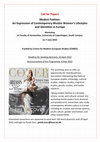
In the last two decades, Islamic modest fashion has transformed from being a niche market to a la... more In the last two decades, Islamic modest fashion has transformed from being a niche market to a large-scale global industry. The commerce, which addresses variety of clothing needs of particularly Muslim women with different understandings of female modesty in Islam, is also field of cultural performance and creativity. The range of items is rapidly widening to reach a diversity of tastes and lifestyles as well as consumption habits in different social classes. The rise of high-end conservative fashion as in the case of Dolce & Gabbana’s modest looks and internationalisation of local producers such as Istanbul-based Modanisa indicate an international marketing trend as well, which includes modest fashion shows and magazines, bloggers, and other social media influencers. Islamic modest fashion should also be considered as an expression of identity in Muslim minority settings, particularly in Europe, and a way of altering stereotypical understandings of Islamic veiling as backward, oppressive, and traditional.
The workshop aims to offer an opportunity for interdisciplinary discussions intersecting the fields of European studies, ethnology, cultural studies, religious studies, migration studies, gender studies, and textile research. Taking modest fashion in a broader artistic, social, and cultural context, the workshop invites papers from doctoral and postdoctoral researchers who study contemporary Muslim culture in Europe including its creative and artistic spheres, youth culture, gender and fashion, and other related fields.
Interested researchers are expected to send their 250 word abstracts until 20 April 2022 midnight to Petek Onur, petek.onur@hum.ku.dk.
Neredeyse son 20 yıldır yılda iki üç kez gittiğim, her gidişimde bana bu şehre ait olma hissiyle ... more Neredeyse son 20 yıldır yılda iki üç kez gittiğim, her gidişimde bana bu şehre ait olma hissiyle beraber bir merak ve keşif hissi de yaşatan Ankara Kalesi’ni şimdi bir sosyolog ve araştırmacı olarak yeniden tanıyorum ve anlıyorum ki aslında tanışmaya yeni başlıyoruz. Geçtiğimiz ekim ayında “Ankara Kalesi ve Hamamönü’nde Yeniden Yaratılan Nostalji” konulu araştırmayla şehrin tarihî bölgelerinde günümüzde yaşanan kent kültürünü incelemek için çıktım Kale’nin sokaklarına. Araştırmanın üç ay süren saha çalışmasıyla, görüşme yaptığım her mekanın öyküsünü ve dünyasını tanıdım ama daha önemlisi Kale’nin ruhunu başka bir açıdan görmeye başladım.


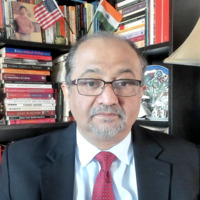







Uploads
Books by Petek Onur
This book presents gendered readings of cultural manifestations that relate to the Ottoman era as a preferred past and a model for the future. By means of claims of authenticity and the distribution of imaginaries of a homogenous desirable alternative to everyday concerns, as well as invoking an imperial past at the national level. In this mode of thinking, shaped around a polarised worldview, Republican ideals serve as a counter-image to the promoted splendour and harmony of the Ottomans. Yet, the stereotypical gender roles inextricably linked with this neo-Ottoman imaginary remain largely unacknowledged, dissimulated in the construction of the desire of an idealised past. Our adaption of a cultural studies perspective in this volume puts special emphasis on agency, gender, and authority. It provides a shared ground for the interrogation, through the contributions comprising this project of knowledge production about the past in light of what constitutes acceptable legitimacy in interpreting not only the canonical literature, but history at large.
Book Chapters by Petek Onur
Papers by Petek Onur
ethnocentricsm, Orientalism and First World feminism and Michel Foucault’s theorization of discourse, power and knowledge, this study makes a discourse analysis of the published works of these studies. It
discusses the ways they are influenced by and reproduce the academic Orientalism in studying Islamic cultures in their discursive representations of Muslim women. Muslim women’s agency, subjectivity
and otherness in the ethnographies are highlighted as the most critical issues to be analysed in this respect. The analysis suggests that all of them represent Muslim Turkish women as victims of religion, patriarchy and traditions, fail to consider the complexity and diversity of Islamic beliefs and rites, fail to contextualize the Islamic culture they observed, and suggest the existence of a persistent and constant
legitimating structure for the gender hierarchy.
Conference Presentations by Petek Onur
Feminist Political Writings by Petek Onur
Other Writings by Petek Onur
The workshop aims to offer an opportunity for interdisciplinary discussions intersecting the fields of European studies, ethnology, cultural studies, religious studies, migration studies, gender studies, and textile research. Taking modest fashion in a broader artistic, social, and cultural context, the workshop invites papers from doctoral and postdoctoral researchers who study contemporary Muslim culture in Europe including its creative and artistic spheres, youth culture, gender and fashion, and other related fields.
Interested researchers are expected to send their 250 word abstracts until 20 April 2022 midnight to Petek Onur, petek.onur@hum.ku.dk.
This book presents gendered readings of cultural manifestations that relate to the Ottoman era as a preferred past and a model for the future. By means of claims of authenticity and the distribution of imaginaries of a homogenous desirable alternative to everyday concerns, as well as invoking an imperial past at the national level. In this mode of thinking, shaped around a polarised worldview, Republican ideals serve as a counter-image to the promoted splendour and harmony of the Ottomans. Yet, the stereotypical gender roles inextricably linked with this neo-Ottoman imaginary remain largely unacknowledged, dissimulated in the construction of the desire of an idealised past. Our adaption of a cultural studies perspective in this volume puts special emphasis on agency, gender, and authority. It provides a shared ground for the interrogation, through the contributions comprising this project of knowledge production about the past in light of what constitutes acceptable legitimacy in interpreting not only the canonical literature, but history at large.
ethnocentricsm, Orientalism and First World feminism and Michel Foucault’s theorization of discourse, power and knowledge, this study makes a discourse analysis of the published works of these studies. It
discusses the ways they are influenced by and reproduce the academic Orientalism in studying Islamic cultures in their discursive representations of Muslim women. Muslim women’s agency, subjectivity
and otherness in the ethnographies are highlighted as the most critical issues to be analysed in this respect. The analysis suggests that all of them represent Muslim Turkish women as victims of religion, patriarchy and traditions, fail to consider the complexity and diversity of Islamic beliefs and rites, fail to contextualize the Islamic culture they observed, and suggest the existence of a persistent and constant
legitimating structure for the gender hierarchy.
The workshop aims to offer an opportunity for interdisciplinary discussions intersecting the fields of European studies, ethnology, cultural studies, religious studies, migration studies, gender studies, and textile research. Taking modest fashion in a broader artistic, social, and cultural context, the workshop invites papers from doctoral and postdoctoral researchers who study contemporary Muslim culture in Europe including its creative and artistic spheres, youth culture, gender and fashion, and other related fields.
Interested researchers are expected to send their 250 word abstracts until 20 April 2022 midnight to Petek Onur, petek.onur@hum.ku.dk.